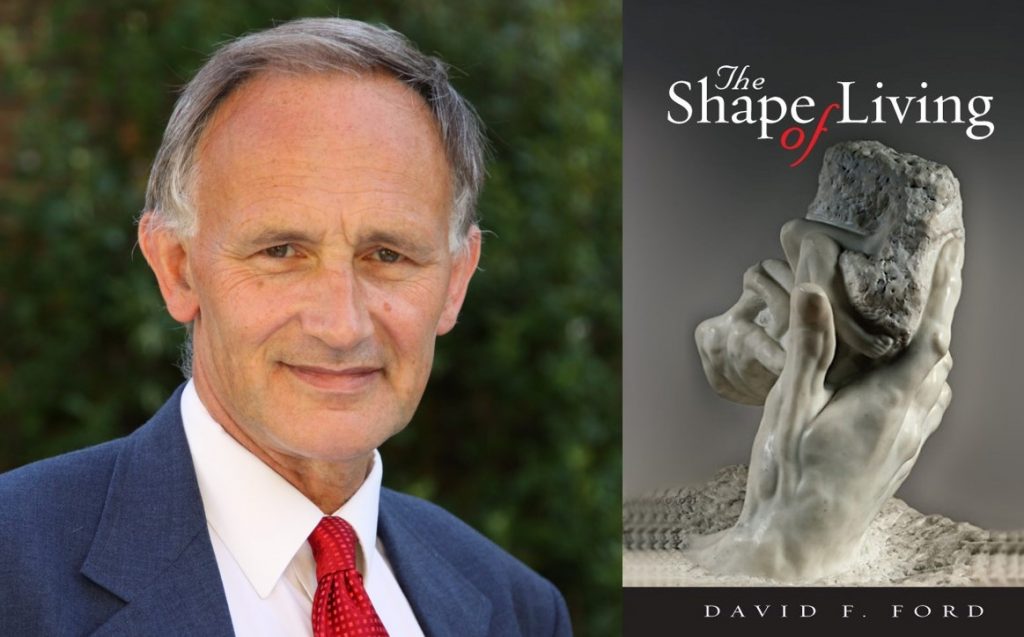
If ever there was a book written for life under the shadow of the coronavirus pandemic, surely The Shape of Living is it! Back in the nineties, David Ford (Irish Christian and Cambridge academic) wrote it as a “book about coping with multiple overwhelmings”. (p. 18)
In this blog I will focus on what he says about the “community of the heart” from a chapter entitled ‘Faces and Voices: Shaping a Heart’. I think it will particularly resonate with what many of us may be experiencing just now. (You can find the Table of Contents and selected extracts from other chapters here on Googlebooks.)
Being physically distanced from family, friends and acquaintances, Val and I have found ourselves to be in many ways actually closer to them. The phone calls, emails, Facebook messages, WhatsApp video calls and shouted conversations through a door or window have all come to mean so much more to us. I have even found myself sending Facebook Friend Requests to people with whom I’ve had little or no contact for years, even decades. One was a student who was a member of my tutor group when I was first a full-time teacher back in the seventies! (He accepted the request immediately!) His name had popped up in a list of ‘People You May Know’ and I was transported back into the classroom in the tower-block by the games field to be again with him and a great group of young teenagers.
David Ford writes:
“’Heart’ is a way of talking about that dimension of our self where memory, feeling, imagination, and thinking come together. The heart is like a home for all the concerns of our lives, where our identity is sorted out year after year. Above all it is inhabited by images of other people and of ourselves in relation to them. Our hearts are filled with the faces and voices of those before whom we live. These are the members of our ‘community of the heart’. (p. 33)
Is it not some of these people in the community of our heart that we find ourselves remembering and contacting in these physically distanced days? Others may have died long ago but they may nevertheless still be “so much a part of our identity that they are woven into the texture of our feeling and thinking” (p. 34).
Some years ago, England’s Teacher Training Agency had as its recruitment slogan: “Nobody forgets a good teacher”. Is there a teacher or teachers in the community of your heart? Miss Thomson (my primary school teacher) and Roddy Bent (a secondary school teacher of English) are certainly prominent figures in mine.
David Ford quotes from ‘Foster-Figure’, a poem about a teacher.[1] The poem is by Irish poet Micheal O’Siadhail, a contemporary of Ford’s when they were students at Trinity College Dublin, O’Siadhail writes of the affirmation he found and even now finds in that teacher’s glance, how he “craved the nurture of his words” and “strings until then silent … stirred, trembling towards song”.
The poem continues:
“I probe the essence of this energy;
no blandishments or blind approval,
his unblinking trust enticed me,
fingered some awareness of worth;
in his praise all is possible.”
Years later, even decades later, the teacher is still there:
“Though at first a copy-cat tremor,
after many storms I’ll still
strum the chords of his assurance,
that music I’ll make my own,
my old resonance I’ll summon up.”
In the praise of Miss Thomson and Roddy Bent, for me all was indeed possible. Of course, it is also the case that nobody forgets a bad teacher. I had one who shall remain nameless, a teacher of Irish Gaelic, who once said to me, “You speak Irish like an Englishman”. It wasn’t a compliment!
David Ford goes on to point out that there are also discouragers in the community of our heart. He quotes from ‘Fallen Angel’, another of O’Siadhail’s poems.[2] This one is about some new teachers who came to the school after staff changes and who were anything but encouragers:
“New brooms with fresh sweeps.
How easily we become how we’re seen;
failure throws an oblong shadow,
I cover hurts with jaunty humour.
pretend not to care, affect disdain,
harden the core to day-by-day
humiliations – tiny erosions of respect –
learn the slow rustlings of shame.
And laugh a bitter laugh! …
How many faces must a wound wear?” (The Shape of Living,pp. 34-35)
These people have shaped and are shaping our lives. Their faces and voices are with us. Let’s treasure the good memories, the memories of the good people. Let’s put relationships with people above the false and fading values. Let’s seek the affirmation of the greatest Teacher of all as we go forward together into the unknowns of these days.
Father God, in these days of multiple overwhelmings, bring us into closer relationships with others and with you and help us to be encouragers and channels of your peace, your shalom. In the name of the Prince of Peace. Amen.
[1] Poems 1975 – 1995: Hail! Madam Jazz, pp. 90-91.
[2] Poems 1975 – 1995: Hail! Madam Jazz, pp.92-93.
